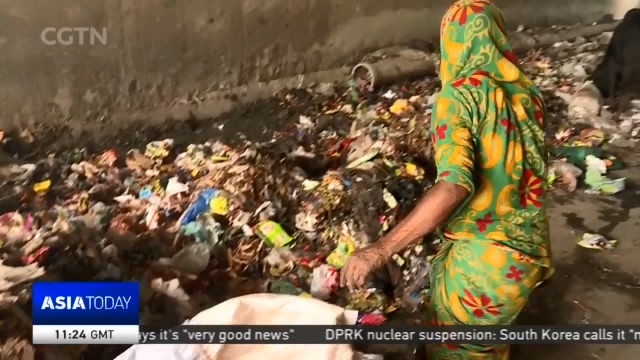
19:37, 21-Apr-2018
Environmental Protection: Cleaning up plastic in India's holy river
02:48

April 22nd is Earth Day. This year's focus is on plastic and raising awareness of the enormous pollution problem it creates. Many of India's environmentalists are marking the occassion by cleaning up the country's holy river, the Ganges. The river dumps almost 120,000 tonnes of plastic waste annually into the ocean. CGTN's Ravinder Bawa reports from Delhi on how the city's implementation of recycling efforts tackle this issue.
The holy river Ganges in India is a big dustbin. Huge amounts of plastic end up in the river due to mismanagement of waste. An average Indian generates 3.2 kilograms of mismanaged plastic per year which is much less to the world average of 17 kilograms but still it is one of the biggest plastic polluters of the ocean in the world.
RAKESH JAISWAL ENVIRONMENTALIST "We do not have a plastic waste management system and we don't have plastic or solid water management system in place and this is the reason the plastic is carried into the river."
This is a common site in India. People dump solid waste anywhere and everywhere. Since managing this solid waste is source of major expenditure for the municipalities, the need of the hour is to change their approach towards waste.
ASHISH JAIN ENVIRONMENTALIST "Nowadays waste is nobody's baby. Waste is a liability. They have to supply use manpower, transportation and suitable land for disposal. This negative approach is the main cause for the nuisance to the environment."
But till people start segregating their garbage at home facilities life these in Delhi will be needed to do their job.
RAJAT RAI HANDA ENVIRONMENTALIST "Delhi produces 10,000 metric tonnes of waste per day. About 80 percent goes to the landfill site. At the Material Recovery Facility we divert the waste away from landfills. Our main purpose is that the waste does not leave the station. It is recycled and repurposed."
In India plastic is available cheap and that's why its consumption has gone up manifold. In such a scenario the lack of proper solid waste management system leads to a new threat. According to the UNICEF report if we continue using plastic at this rate by 2050 there will be more plastic in the ocean than marine life. Ravinder Bawa, CGTN, Delhi.

SITEMAP
Copyright © 2018 CGTN. Beijing ICP prepared NO.16065310-3
Copyright © 2018 CGTN. Beijing ICP prepared NO.16065310-3